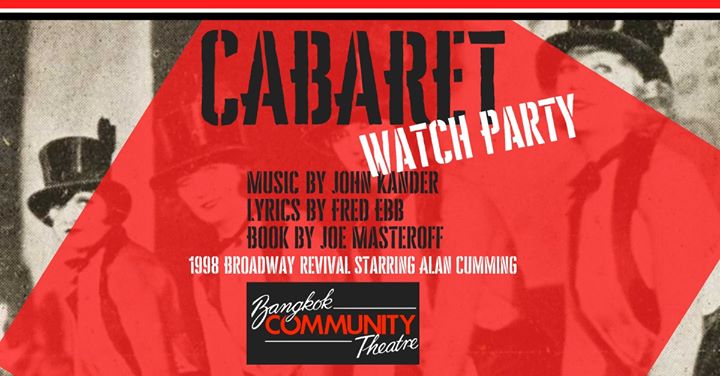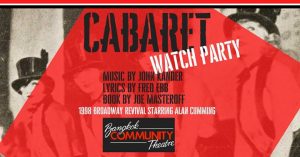At 7pm Bangkok time on Saturday, July 25th the BCT watch party musical will be “Cabaret”
Please RSVP to rsvp@bangkokcommunitytheatre.com so that we can send you the private link to this musical online event.
With people staying home and theatres around the world closed for the forseeable future, BCT hopes to bring a little theatre magic into your lives by sharing these weekly “Filmed live on stage” productions. Join us.
ABOUT THE SHOW
Cabaret is a 1966 musical with music by John Kander, lyrics by Fred Ebb, and book by Joe Masteroff, based on John Van Druten’s 1951 play I Am a Camera, which was adapted from the short novel Goodbye to Berlin (1939) by Christopher Isherwood. Set in 1931 Berlin as the Nazis are rising to power, it focuses on the nightlife at the seedy Kit Kat Klub, and revolves around American writer Cliff Bradshaw and his relationship with English cabaret performer Sally Bowles.
A sub-plot involves the doomed romance between German boarding house owner Fräulein Schneider and her elderly suitor Herr Schultz, a Jewish fruit vendor. Overseeing the action is the Master of Ceremonies at the Kit Kat Klub. The club serves as a metaphor for ominous political developments in late Weimar Germany.
1993 London revival
In 1993, Sam Mendes directed a new production for the Donmar Warehouse in London’s West End. It starred Jane Horrocks as Sally, Adam Godley as Cliff, Alan Cumming as the Emcee and Sara Kestelman as Fräulein Schneider. Cumming received an Olivier Award nomination for his performance and Kestelman won the Olivier for Best Supporting Performance in a Musical. Mendes’s conception was very different from either the original production or the conventional first revival.
The most significant change was the character of the Emcee. The role, as played by Joel Grey in both prior incarnations, was an asexual, edgy character with rouged cheeks dressed in a tuxedo. Alan Cumming’s portrayal was highly sexualized, as he wore suspenders (i.e. braces) around his crotch and red paint on his nipples.[7]
Staging details differed as well; instead of “Tomorrow Belongs to Me” being performed by a male choir, the Emcee plays a recording of a boy soprano singing it. In the final scene, the Emcee removes his outer clothes to reveal a striped suit of the type worn by the internees in concentration camps; on it are pinned a yellow badge (identifying Jews), a red star (marking Communists and socialists), and a pink triangle (denoting homosexuals). Other changes included added references to Cliff’s bisexuality, including a brief scene where he kisses one of the Cabaret boys.[8] “I Don’t Care Much”, which was cut from the original production, was reinstated, and “Mein Herr” was added from the film.
1998 Broadway revival (which we will be watching)
The second Broadway revival was based on the 1993 Mendes-Donmar Warehouse production. For the Broadway transfer, Rob Marshall was co-director and choreographer. The production opened after 37 previews on March 19, 1998, at the Kit Kat Klub, housed in what previously had been known as Henry Miller’s Theatre. Later that year it transferred to Studio 54, where it remained for the rest of its 2,377-performance run, becoming the third longest-running revival in Broadway musical history, third only to Oh! Calcutta! and Chicago. For the Broadway production, Cumming reprised his role as the Emcee, opposite newcomers Natasha Richardson as Sally, John Benjamin Hickey as Cliff, Ron Rifkin as Herr Schultz, Denis O’Hare as Ernst Ludwig, Michele Pawk as Fräulein Kost, and Mary Louise Wilson as Fräulein Schneider, along with Joyce Chittick, Leenya Rideout, Erin Hill, Christina Pawl, Kristen Olness, Michael O’Donnell, Bill Szobody and Fred Rose. The Broadway production was nominated for ten Tony Awards, winning four for Cumming, Richardson and Rifkin, as well as the Tony for Best Revival of a Musical.
There were a number of changes made between the 1993 and 1998 revivals, despite the similarities in creative team. The cabaret number “Two Ladies” was staged with the Emcee, a cabaret girl, and a cabaret boy in drag and included a shadow play simulating various sexual positions.[8] The score was entirely re-orchestrated, using synthesizer effects and expanding the stage band, with all the instruments now being played by the cabaret girls and boys. The brutally satiric “Sitting Pretty”, with its mocking references to deprivation, despair and hunger, was eliminated entirely, as it had been in the film version, and where in the 1993 revival it had been combined with “Money” (as it had been in 1987 London production), “Money” was now performed on its own. “Maybe This Time”, from the film adaptation, was added to the score.


